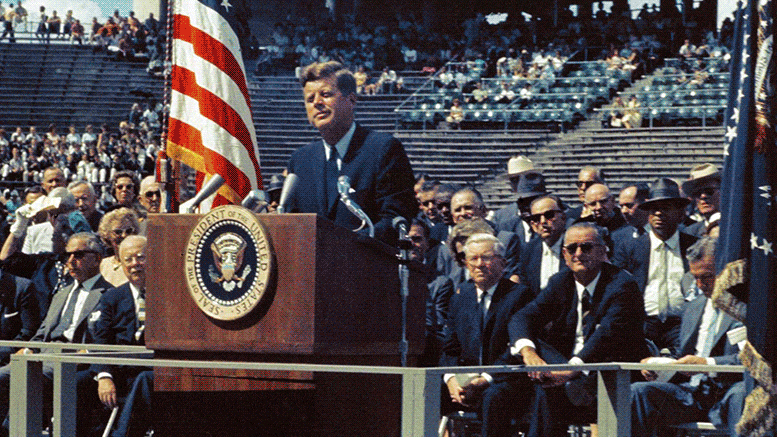
Herdenking van een mijlpaal voor bemande ruimtevluchten…
“We kiezen ervoor om naar de maan te gaan…”
Update over plannen Artemis I …
en wat NASA’s volhardingsvoertuig tot op de dag[{” attribute=””>Mars … a few of the stories to tell you about – This Week at NASA!
60e verjaardag van de toespraak van JFK aan de Rice University
Op 12 september vierden NASA en Rice University de 60ste verjaardag van de oprichting van De toespraak van John F. Historisch Kennedy in Rice in 1962. In die toespraak bevestigde de president de natie opnieuw tot het doel dat hij in mei 1961 aan het Congres had voorgesteld, om astronauten voor het einde van het decennium op de maan te laten landen en ze veilig naar de aarde terug te brengen. Zoals NASA-beheerder Bill Nelson opmerkte tijdens de keynote-toespraak tijdens het evenement, hielp de toespraak van de president destijds ons leiderschap op het gebied van bemande ruimtevluchten, en blijft ons vandaag inspireren terwijl we werken aan de terugkeer van mensen naar de maan en uiteindelijk naar Mars. Als onderdeel van het Artemis-programma van NASA.
60 jaar geleden zette president Kennedy de wind in de zeilen op de New Sea of Space Exploration en die missie houdt nooit op. Het is een missie van de wetenschap en de vooruitgang van de menselijke geest om uit te breiden wat mogelijk is.” – Bill Nelson, beheerder van NASA

De weergave van deze kunstenaar toont een luchtfoto van de lancering van een NASA Space Launch System (SLS)-raket. Deze configuratie van de raketbemanning in blok 1 zal de eerste van drie Artemis-missies naar de maan sturen. Krediet: NASA/MSFC
Nieuwe streefdata voor kritische testen en lancering van Artemis I
Test onze onbemande cryogene demonstratie Artemis I vliegtestdoel nu uiterlijk woensdag 21 september. Ondertussen heeft het bureau een lanceringsmogelijkheid op 27 september aangevraagd voor het Space Launch System, of[{” attribute=””>SLS rocket and Orion spacecraft, with a potential backup opportunity of October 2 under review. During the cryogenic demonstration, teams will load super cold liquid oxygen and liquid hydrogen into the core stage and interim cryogenic propulsion stage of the SLS to confirm that a hydrogen leak has been fixed. Artemis I is the first integrated flight test with the SLS and Orion. The mission will send Orion beyond the Moon and return the spacecraft back to Earth.

NASA’s Perseverance rover puts its robotic arm to work around a rocky outcrop called “Skinner Ridge” in Mars’ Jezero Crater. Composed of multiple images, this mosaic shows layered sedimentary rocks in the face of a cliff in the delta, as well as one of the locations where the rover abraded a circular patch to analyze a rock’s composition. Credit: NASA/JPL-Caltech/MSSS
Perseverance Rover Investigates Geologically Rich Mars Terrain
NASA’s Perseverance rover is collecting samples and analyzing the composition of rocks at an ancient river delta located in the Red Planet’s Jezero Crater, an area long considered by scientists to be a top prospect for finding signs of possible ancient microscopic life. In its analysis of a sample from a rock named Wildcat Ridge, the rover’s SHERLOC instrument registered the most abundant organic detections on the mission to date. Further conclusions about what is contained in this sample will have to wait until it’s returned to Earth for in-depth study as part of the Mars Sample Return campaign, an international collaboration led by NASA and the European Space Agency.

Dr. Thomas Zurbuchen, the associate administrator for NASA’s Science Mission Directorate. Credit: NASA
NASA Announces Pending Departure of Science Associate Administrator
Dr. Thomas Zurbuchen, the associate administrator for NASA’s Science Mission Directorate, is planning to leave the agency at the end of 2022. His six years at NASA have included some of the agency’s most inspirational moments, from sending the first spacecraft to touch the Sun, to launching and sharing the first images from the James Webb Space Telescope, to landing the Perseverance rover on Mars along with the Ingenuity helicopter that went on to make the first powered, controlled flight on another planet. The agency is conducting a nationwide search and open competition for a new associate administrator.

This artist’s concept of NASA’s QueSST jet reflects the airplane’s final configuration following years of research and design engineering. Credit: Lockheed Martin
Ground Recording Stations Tested for Future Quiet Supersonic Flight
The team at NASA’s Armstrong Flight Research Center recently completed a flight series called CarpetDIEM which tested state-of-the-art ground recording stations designed to hear and record the unique sounds that will be generated during future supersonic flights by NASA’s X-59 aircraft. The X-59’s goal is to reduce the intensity of sonic booms, which are heard when an aircraft flies faster than the speed of sound, to a quiet sonic “thump.” When the X-59 flies, NASA will record the sonic thumps as part of the effort to validate its quiet supersonic design.
That’s what’s up this week @NASA …

“Gamedokter. Een zombiefanaat. Muziekstudio. Ninjacafé. Televisieliefhebber. Aardige fanatieke alcoholist.





More Stories
China is van plan het Tiangong-ruimtestation uit te breiden; Stel deze in op “Space Rule” omdat het ISS wordt uitgeschakeld
De Verenigde Staten detecteren het eerste geval van de H5N1-vogelgriep bij een varken, wat aanleiding geeft tot bezorgdheid voor de mens
NASA zal in 2025 de ruimtewandelingen aan boord van het internationale ruimtestation hervatten na een lek in het ruimtepak